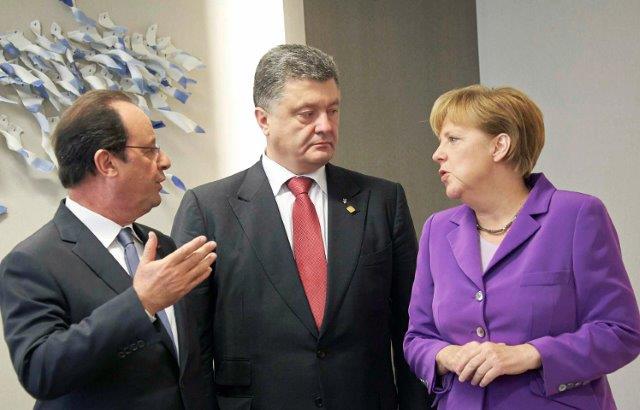The visit of the Ukrainian president to Germany is not simply another nod to protocol. At this stage, Petro Poroshenko’s trip and his talks with Angela Merkel may provide the answer to the question of how the Minsk process develops and if sanctions against Russia are preserved.
As recently as several months ago it was possible to say that a simple formula was in effect — that there could be no discussion of lifting the sanctions before Ukraine regains control of its borders. But today our country is being subjected to enormous pressure to fulfill what the West calls “the Ukrainian portion” of the Minsk agreements. Our Western partners are virtually ignoring the fact that the fulfillment of these commitments, which are tied to constitutional and legislative changes in Ukraine, is to be preceded by the end of the war and the withdrawal of occupation troops at least from the line of demarcation.
And here the question arises: why exactly does the West want us to fulfill our obligations but not Russia? Is it in order to have the possibility of extending the sanctions against Putin’s regime or in order to cancel them? Simply put, is the West really all that interested if our constitution is changed? Will it not be simpler for the EU if these changes did not happen? Then the responsibility for the fact that the Minsk process is stalled could be dumped on Ukraine. And it would be possible to stop “punishing” Russia which is “trying so hard” to achieve peace.
At least this is the basic tactic of Russian diplomacy. And in the West there are many who agree with this tactic for economic reasons or out of corruption. Germany’s position here has always been a decisive factor. But now Germany may not play this role for two reasons: first, the weakening of Angela Merkel’s domestic political positions; and second, the weakening of the position of Germany itself within the EU. As a result of elections, more left-wing governments are appearing in EU countries that are inclined to compromise with Moscow. And if yesterday this was only Greece, dependent on EU’s economic aid, then today it is also Portugal and tomorrow it is likely to be Spain. This “left-wing front” could easily block sanctions. And Berlin may be tempted to lead this process rather than trying to stop it.
Can Petro Poroshenko prevent this? To some extent, yes. The Ukrainian president can demand that the countries of the “Normandy format” establish a clear timeframe for the implementation of each item of the Minsk agreements since they have already been extended for the current year. And he has a right to know exactly what the EU would consider as sufficient implementation of the Minsk agreements and if this implementation would be tied to the lifting of sanctions against the aggressor or not? And one more thing: is Russia in this situation still the aggressor, a view that was recently accepted in the West, or is it now the “mediator” as claimed by Gryzlov, Lavrov and Patrushev?
European politicians — both on the right and the left — will not be able to avoid answering these questions. If we cannot prevent the lifting of sanctions, we need to turn this decision into a shameful one for the European Union. The economic collapse of Russia will not prevent this decision, and it will not help the European economy. But the feelings of shame and embarrassment could be useful in facilitating further cooperation between Ukraine and the EU.
Because the decision to lift sanctions without ending the occupation of Ukraine will divide Europe into countries that adhere to European values and those that disdain them. And for Ukraine it is important to remain with those who have not forgotten about values and to build a new Europe with them.







